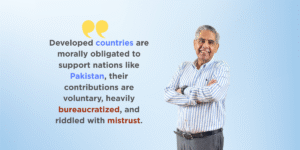What Pakistan’s governance, inequality, and underinvestment reveal about our future – MT in conversation with Ali Tauqeer Sheikh
Ali Tauqeer Sheikh is one of South Asia’s leading climate policy strategists and educators, with over three decades of experience advising governments, development agencies, and civil society organizations. An expert on climate policy in the region, he has played a pivotal role in shaping sustainable development strategies and advancing climate resilience across sectors.
Whether you live in a megacity or a mountain hamlet, the climate crisis is now impossible to ignore. Its signs are everywhere — from urban flooding to vanishing glaciers, from unlivable heatwaves to collapsing food systems. And yet, understanding climate change in Pakistan requires more than just meteorological analysis. It demands a reckoning with how we’ve developed-or, more accurately, underdeveloped-our country.
Mr. Sheikh begins by drawing a sharp connection between poverty and climate vulnerability. “The less we invest in people and institutions,” he explains, “the more exposed they become.” Pakistan’s poorest — women, children, the elderly, and those living in fragile ecosystems — are repeatedly the first victims of climate disasters. Our cities, largely informal sprawls, lack even the most basic municipal services. “When it rains or during heatwaves,” he continues, “we don’t even collect data on their suffering.” In his telling, Pakistan’s climate story is not a recent crisis; it is a deep-rooted legacy of inequity, dating back to the colonial period and further distorted by policies under military regimes, nationalization, and the Islamization era.
MT: Has climate change revealed more about our social inequalities than our environmental policies?
Education, Sheikh notes, is both a casualty and a culprit. With extreme weather frequently disrupting school operations — and many being used as shelters — basic delivery is now under threat. Meanwhile, climate literacy is glaringly absent from our textbooks. “Curriculum reform in Pakistan takes seven to nine years,” he says, “while we’re dealing with weekly crises.” Teachers, especially in government schools, are underqualified and underpaid. He raises an alarming but rarely discussed issue: the millions of children studying in madrasas are being taught to interpret climate change not as a scientific phenomenon but as divine punishment — a view that discourages action and reinforces fatalism.
MT: Can you solve a 21st-century climate crisis with a curriculum designed in the 1980s?
When asked about the 18th Amendment, often viewed with suspicion in federal circles, Sheikh offers a powerful defence. Vulnerability, he insists, is local — and so must be the response. “Sitting in Islamabad, you won’t know the drainage layout of a bazaar in Hyderabad,” he points out. Yet, Pakistan has failed to empower its third tier of governance: local governments. The federal-provincial-local governance chain is broken by elite capture and mutual distrust. What’s worse, this dysfunction has direct economic consequences. Pakistan has struggled to absorb international climate finance, not due to lack of access, but because of weak spending mechanisms and institutional paralysis at the local level.
MT: Is it time to constitutionally protect local government before we collapse under our own bureaucracy?
Sheikh is equally candid when asked about climate finance mechanisms like the Green Climate Fund and the Climate Investment Fund. “It’s complicated,” he admits. While developed countries are morally obligated to support nations like Pakistan, their contributions are voluntary, heavily bureaucratized, and riddled with mistrust. Transparency requirements delay disbursements, while our own weak institutional capacity makes it difficult to meet application and verification standards.

Developed countries are morally obligated to support nations like Pakistan, their contributions are voluntary, heavily bureaucratized, and riddled with mistrust.
How can Pakistan expect climate progress when its most agile problem-solvers — the private sector — are kept out of the room?
In essence, he says, “We are not short of commitments — we’re short of execution.”
Where does this leave the private sector? Unfortunately, sidelined. Sheikh argues that the government has largely elbowed out private actors from the climate arena. The two sectors operate in parallel universes — one thrives on innovation, efficiency, and risk; the other on bureaucracy, suspicion, and delay. “We haven’t even briefed the private sector on our national climate commitments,” he laments. Local businesses with decades of experience are either winding down or moving abroad. Despite its rhetoric, the government has failed to retain even the investors it already has.
Are we preparing Pakistan’s youth to lead the green economy — or just to wait in line for jobs that no longer exist?
As the conversation shifts to youth, Sheikh is both hopeful and cautious. Pakistan’s youth bulge, if equipped with the right tools, could be transformative. “But we are failing to turn them into assets,” he warns. Instead of training graduates to become entrepreneurs, we teach them to queue for government jobs. What’s needed is an entire ecosystem of mentorship, financing, and institutional support for climate-smart enterprises, ranging from agri-tech and renewable energy to circular economy models.
MT: Will we continue to treat climate change as a weather problem, or finally confront it as a justice issue rooted in power and inequality?
“The sky is the limit,” Sheikh says, “if only we invest in them.” It’s about governance, inequality, and trust. It’s about who decides, who benefits, and who is left to drown, both metaphorically and literally. In Sheikh’s words, “climate change is not creating new divides — it is exploiting the ones we have refused to close.” His call to action is clear: localize the response, trust the people, educate with purpose, and unleash the potential of the next generation before time runs out.
Interview conducted by Aliya Agha for the MT Outloud Podcast, a production of Margalla Tribune.







